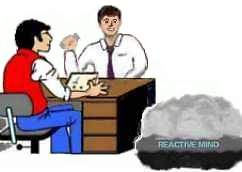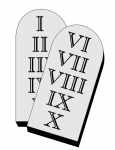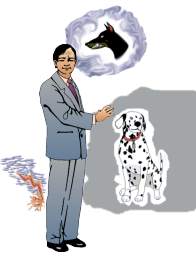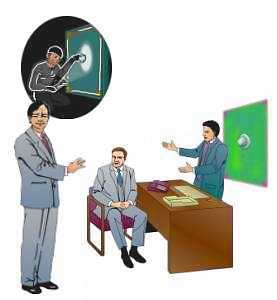What is a Withhold? |
||||||
|
Since level two is dedicated to the auditing of overts and withholds we better get a good understanding of what it is. Let us start with going over the two most important definitions, (a) overts and (b) withholds. An overt is a bad deed; a stupid act - something you know you shouldn't have done; or it can be something you should have done but didn't. The withhold is the attempt to keep it secret or hidden. Let us be a little more formal:
So the W/H is different from the overt as it comes later. It is a no-action or a no-motion after a doingness; it tends to hang up in time and float along in time. It can be this big secret the person shouldn't tell anybody but which is always on his mind. The action content he doesn't want known, makes it compelling, dramatic and alive and difficult to forget.
The Reactive Mind could be viewed as the collection of all the persons withholds. They have been piled up over time in the persons dealings and relationships with groups and people. It causes the person to withdraw and individuate. At different points it has caused him to break off his relationships and associations. This can happen as a result of him feeling more and more distant from and different from the group. He has individuated. This usually happens gradually long before he leaves or breaks off. It is still with him long after the break; he simply hasn't really left the experience behind. The action content of these withholds tend to be dramatized by the pc at the same time he is trying to forget about them. This situation leads to all kinds of dramatizations and irrational behavior. Since the overt can be viewed as an action he committed in order to solve a problem he now uses the content of the withholds to 'solve' problems and commit new overts that then has to be withheld.
After the glorious battle, which the Holy Crusaders had won, there was a great victory party. Each of the warriors would step forward and tell their story how they had fought and killed their enemies. Joe withheld from the group that he had not only failed to kill an enemy, but had actually saved the life of one. Thus we have the 'no-action' of the withhold after the action of saving the little girl's life. This was of course a clear breach of the mores or 'now I am supposed to' of a Holy Crusader in battle. Because of this breach of their code and other similar breaches, Joe finally individuated from the group of Holy Crusaders. He left. At some point later in time we find our individual as a member of another group. Joe had experienced a complete change of heart and attitude and is now a member of 'Save the Innocent Children Society'. Here the mores dictates to show great love, respect and kindness for children and for all of humanity. The tone of the group is compassionate and loving. But when our man runs into people that show indifference or cruelty towards children, and when he runs into difficulties with his own group members he would display a temper. Joe will reactively try to solve his problems in and around 'Save the Innocent Children Society' with his old methods and mores he adopted in the Holy Crusaders. This leads to numerous incidents and clashes and it leads to a string of breaches of the mores and rules for good conduct of the 'Save the Innocent Children Society'. He withdraws more and more from the group and finally Joe "looses it" and smash a computer in the office. Joe has to leave this group.
Our individual now becomes a passport inspector at the customs department. Joe inspects travelers and passports in an airport. His job is to do it by the book. The mores of his new group dictates him to show no emotion, be polite and formal. This causes him many difficulties as he still carries his mixed bag of values from the earlier groups along with him. In some situations he is too forgiving and overbearing, especially when it comes to children. In other situations Joe can't help but feel strong emotions and prejudices, especially when he sees people of obviously another faith than his own, come up to his desk. His old mores are secretly acted upon in certain situations and gives him a new set of withholds and problems; because, what at one point was right obviously is wrong in his present job and functions. It is not what a passport inspector is supposed to do. So you see how our individual carries these old methods and mores along with him. They got frozen and recorded in the Bank thanks to the breaches he committed in the past. The action of the overt and the inaction of the withhold make them float in time and in a way be ever present. The action of the overt and the motionless nature of the withhold locks up against each other. We have an attempt on the part of the individual to Not-is their existence, simply get rid of them by pretending it never happened. That is a Not-is.
Even though Joe is trying hard to forget the original incidents, they are still with him. Reactively he is living by these rules and mores and following them although they no longer fit the group or the situation he is in. It is important to realize, that withholds are always linked to a moral code, a code of behavior and a set of 'now I am supposed to's. It starts with agreeing to such rules and then by accident or overtly break them. When such a breach occurs the individual feels compelled to withhold it from the other group members out of self preservation, fear of loosing status and possible punishment. As this goes on over time the person is less and less active in the group. He becomes a passive member and finally not a member at all. This is what we mean by individuation. The individual becomes more and more separated out or individuated from the group.
Processing Withholds In Confessional type of approach, you would start with a prepared form or list of possible overts. This is the trick. Whoever makes the list should have an intimate knowledge of that group and its mores. It is no big mystery what type of rules will cause what type of overts and withholds. Most rules begin with "You shall not..." Doing it anyway is of course a breach. In Confessionals the trick is to get all of the overts available and get all of each overt/withhold. You don't want wild stories about "I have done all these terrible things" (unless they are true). Some pc's will tend to dramatize it and make it much worse, they like to tell dramatic stories. Other pc's will tend to try to minimize their bad deeds to "It's really nothing, but..."
The 'Exact truth' per this Axiom is what we really want, because that is what brings about As-is'ness. You could say a good Confessional is the 'Actual experiment', that brings about As-is'ness and the pc can again feel free about that group and finally leave it and its values behind. He does not anymore have to dramatize withholds connected with that group. In relation to one's present group, it enables the pc to again fully participate and enjoy his involvement.
The Bank and old Survival Patterns
You could say the Bank is a collection of old survival patterns. Originally it seems designed to be a safety mechanism. By recording into the Reactive Mind situations that went wrong an automatic control system was built up. If the organism and individual went partly unconscious the Reactive Bank with all these automatic warnings against danger in place, would take over and dictate the course of action. This mechanism seems to work on an animal level. Unfortunately it never worked very well in a human civilization based on language and subtle differences: the Reactive Mind is not able to see differences and nuances of situations. We have the A=A=A=A type of thinking dictated by the Bank. A withhold has a number of survival considerations in it. The original overt was done based on old survival patterns (the mores of past groups) or it was done in an attempt to solve a problem for the individual. That is old survival - just like the Bank. The withholding part is done due to the present environment and group and its mores of "Don't do it!". That's survival too; new survival you could say. So you have the Reactive Bank which is full of unconscious concerns about survival based on Engrams and automatic recordings. The withhold is the individual doing something similar, but based on analytical experiences. But this activates the Reactive Bank and makes the withhold the link between the pc and his Bank. The individual withholds the overts he has done against the group and its moral code in order to avoid punishment or loss of status. This he does in an effort to preserve or enhance his own survival. As it develops, he withholds himself more and more from the group and finally leaves in an effort not to commit any further overts or to protect himself. All this is under the headline of 'Survival solutions'. This ties in closely with the rest of the content of the Reactive Mind - Engrams, Secondaries and so on. The 'lesson' of Engrams is to avoid future danger situations. You don't want to get into a situation that can lead to injury or death. So the Engrams dictate these 'do's and don't on the basis of how dangerous they are recorded to be to the organism. So the withhold is the thing that ties the pc to
his Reactive Mind by A=A=A=A and restimulation. The withhold 'does what
the person's Reactive Mind does'. They operate in the same way and becomes
the bridge between the pc and his Reactive Mind. Pulling O/W's also breaks the vicious cycle of having to commit new overts and withholds. The withhold creates ignorance on the part of others and it results in ignorance to the person himself. So you could see processing of withholds as a step in direction of knowingness and increased awareness. When processing withholds you are attacking the whole basis of the Reactive Mind. Done under Auditor's Code it is an activity the auditor should do earnestly and effectively. The equation of Auditor + PC is greater than the pc's Bank should be at work. It is known as 'Auditor's Trust'. The pc is assisted to be able to overpower his Reactive Mind and get the exact content of the withhold. You may run into all kinds of objections stemming from the Reactive Mind itself, but if you keep your 'Auditor's Trust' clean you will finally get it. To let the Reactive Mind win would consist of another overt. In Confessional auditing you should get your answers without developing Meter dependency. This raises the confidence between auditor and pc and a spirit of working together in overpowering the Reactive Mind. The auditor should only use the Meter when needed to assist the pc in getting all there is to get. Happy hunting!
|
||||||

















